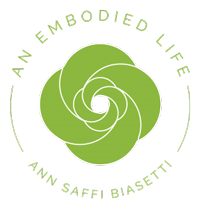What is Embodiment?
Embodiment can be simply defined as living life informed through the sense experience of the body. Our bodies are our first lived experience in the world before words and the development of higher intelligence. Unfortunately, as we grow we often attempt to understand our “problems” just through one area, the mind, rather than using all that is available to us for knowledge and insight. Our body offers us a whole area of often untapped knowledge and awareness that is highly effective in creating lasting insight.
It is through body knowledge and re-learning this knowledge that we begin to develop awareness on a new level. This level of awareness goes beyond just the story of the past or the one feared about the future. It is knowledge that offers skills to help keep you present and connected to live life more fully. Our body is our gateway to mindfulness.
I have spent many years in embodiment and mindfulness training, along with studies of Buddhist philosophy and psychology. It is through this knowledge and experience that I have come to integrate the use of the body in psychotherapy sessions in an integrative technique I call Mindfulness-Based Embodiment (MBE)™.
Mindfulness-Based Embodiment (MBE)™ is based on the Four Foundations of mindfulness and honors the body as a primary teacher of wisdom and insight awareness. Various interventions are used throughout a session to assist you in increasing awareness of your body, such as in sensation and breath.
The somatic interventions I use are informed and framed through the Polyvagal Theory (Stephen Porges and Deb Dana)along with my training in Yoga Therapy and Mindful Awareness Body-Based Therapy (MABT) which is an evidenced-based program created by researcher Cynthia Price, creator of the MAIA (Interoceptive Awareness measurement scale). MABT is a program of building interoceptive awareness skills and helping you to use them in your daily life for ongoing practice in body awareness and life changes.
Interoceptive Awareness is being able to sense your body from the inside out and it is an essential brain-based skill of building corrective body signals and awareness of these as well as self-development. It is an essential skill to build in trauma and eating disorder recovery as well as for emotional regulation and over all well-being.
What Does Embodied Psychotherapy “Look like?”
Somatic psychotherapy is about accessing and using information from your body and your nervous system to increase your self-awareness. It is a “bottom-up” approach used to reprogram long-held beliefs and stories that no longer serve you as well as for proper trauma resolution work. Somatic psychotherapy teaches you how to live a more embodied (connected to your body life).
In an embodied psychotherapy session, I help you to slow down and internally “listen” to the experience of your body and your nervous system. Sometimes, this may appear to be no different from any other talk therapy session. However, the difference is in my method and style of helping you to attend, witness in the moment, and discover the subtle shifts of your nervous system, and information your body is offering to you as you speak. We are so programmed to attend just to our stories that we often lose connection to what our body is experiencing along with feelings and thoughts, and what this actually feels like in our body.
From here we explore, in various ways, such as specific verbal dialogue, sometimes breath work, and sometimes movement, such as subtle shifts to maybe even a relaxing restorative yoga pose that opens areas of the body where tension is held. You will also learn, through psycho-education, a great deal about your nervous system and how you operate in the world as well as notice when and how that begins to shift.
How Can This Help Me Different From Traditional Talk Therapy?
Studies in mental health and the medical professions have proven that long after an emotional trauma, the body still responds as if it was a current event even though memories may have faded. Traumatic events and emotions leave an “imprint” in our sensory and hormonal systems. Therefore, long after the event has occurred there still may be bodily sensations, reactions and feelings that continue to occur and cause anything from worry, anxiety, fear, and panic attacks, to states of depression. We are now discovering that to have an effect on this “visceral” response we must work in heightening awareness of sensations, and integrating the body into treatment along with the mind. However, it need not be a trauma. All emotion and thoughts have a body connection. We learn to discover what that connection is about. Grounding through the experience of the body we “re-claim” the body as a safe place to be, which allows a safer way for insight to develop.
INDIVIDUAL PSYCHOTHERAPY
I specialize in working in the following areas along with an expertise in eating disorder recovery:
Primary eating disorders: Anorexia, Bulimia and Binge
Disordered eating and body image disturbance/dissatisfaction (see eating disorder treatment page for further information)
- Depression
- Anxiety
- Panic Disorder
- Life Transitions/relationship/marital issues
- Women’s issues
- Spiritual mentoring
PROFESSIONAL SERVICES OFFERED
My professional services are as listed below:
- Professional consultation for program development
- Professional consultation for staff training and development
- Mentorship services for new and experienced therapists
- Embodiment Training for mental health professionals
- Restorative yoga training/yoga therapeutics for yoga teachers and advanced students
